Two years ago, I moved from St. Petersburg to Tartu, Estonia, to study for a Master's degree in Computer Science. Before moving, I spent a lot of time looking for articles where students like me would describe their personal experience of studying in Estonia as a foreign student, but my searches were practically unsuccessful. 2 years have passed, I finished my master's degree, and now I want to share my experience of entering and studying at the University of Tartu , and, I hope, help those who now lack such information as I once did.
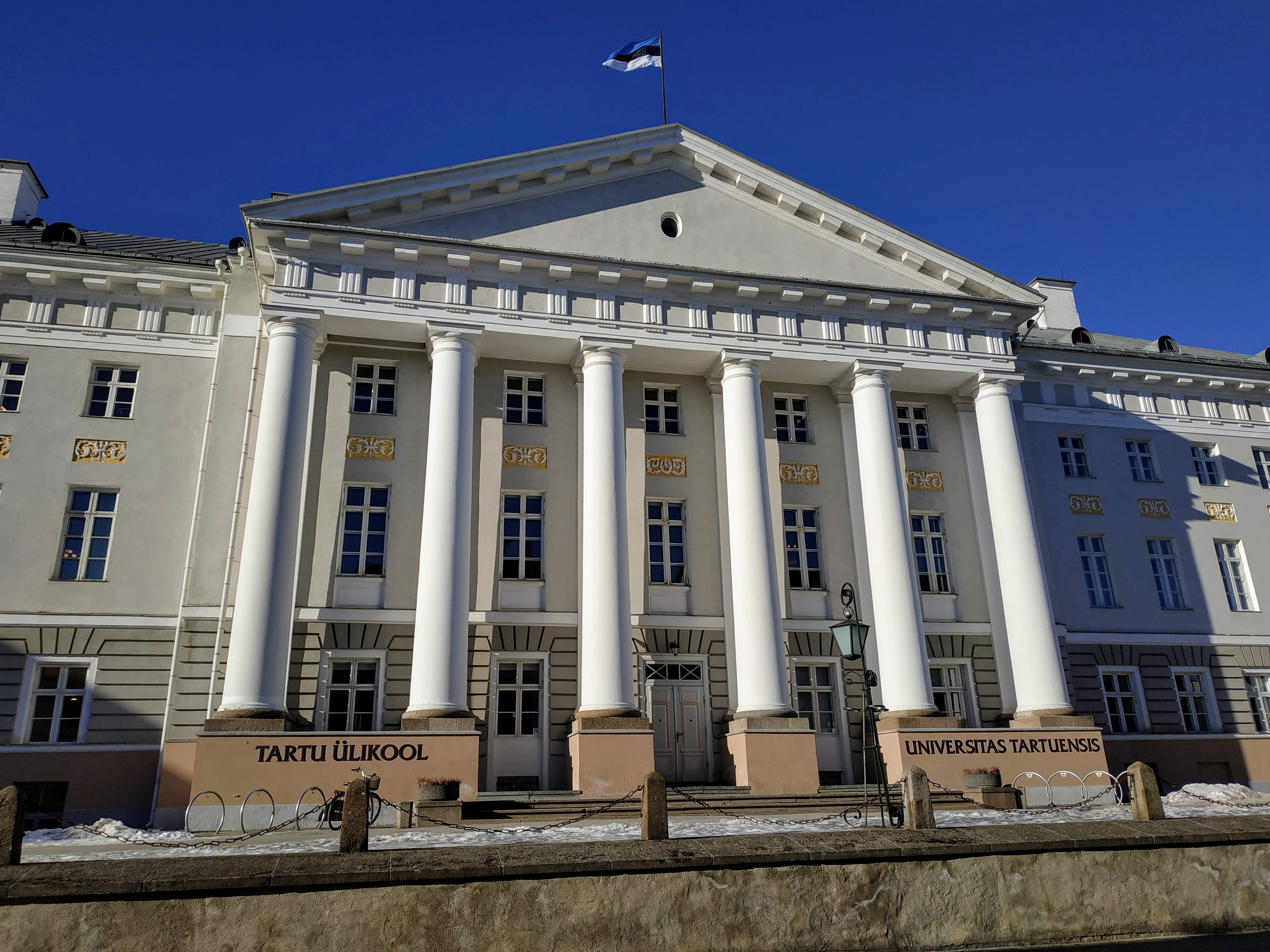
1. About me
In 2017, I graduated from St. Petersburg State University with a Bachelor's degree in Applied Mathematics, Physics and Control Processes. I was engaged in hydrodynamics, but by the end of the bachelor's degree I realized that I wanted to try myself in the IT field. I decided that I would go to a master's degree in a specialty related to programming. This realization came to me quite late, and I did not very thoroughly approached the choice of the university and the program. At that time I did not want to move from St. Petersburg, so I entered the magistracy at ITMO, specializing in “Software in infocommunications”. But already in the summer before my master's degree, I began to realize that this was not quite what I needed. I was like a couple until October and decided that I would take the documents and take the gap year. This was the beginning of my path to master's degree abroad.
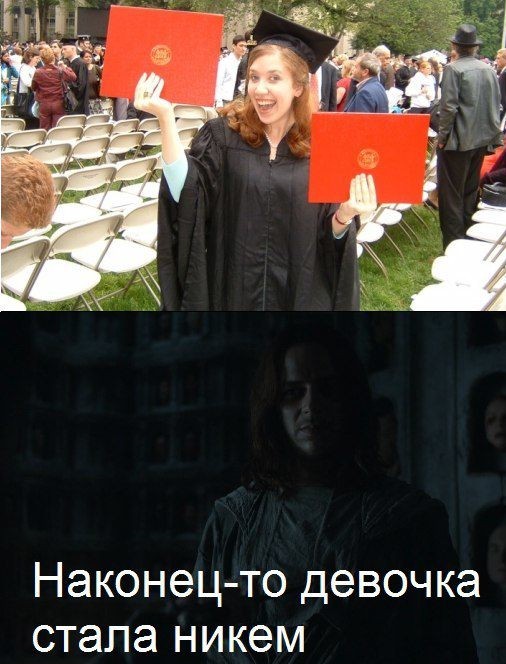
At the end of my undergraduate degree, I started programming a little in Python and became interested in machine learning. Then I watched a couple of introductory ML courses on Coursera and came to the conclusion that I will be applying for a Data Science or Computer Science program in order to build a career in Data Science in the future. So by the time I left ITMO, I had decided on the direction. All that remained was to choose a university, pass English and submit documents.
2. Admission
So, by November 2017, the decision to apply for a master's degree abroad was finally made, and I began my journey towards applying to universities.
2.1 Preparation
To enroll in a master's program in English, you usually need to pass IELTS or TOEFL - standardized tests to assess your level of English. I decided to take IELTS. Most European universities require an overall IELTS score of 6.5, but some take from 6.0 or even 5.5 (usually a lower score is required for technical specialties). To summarize, to apply to Europe for an English-speaking master's program, you need to have a confirmed level of English B2.
I never studied English additionally, and in general, it was one of the most disliked subjects. I understood that he was important, but I could not force myself to study. This also influenced my decision to go abroad - I wanted to improve my English. So, when in October I thought about applying, I realized that in English I did not hold out, and my level was about B1. In the middle of November, I started taking courses in preparation for IELTS. The courses lasted a month, and they helped a lot to save time and not look for information on how to prepare yourself. We were guided by teachers, told about different techniques that help to get more points. I spent the whole month solving tests and learning a lot of new words on Memrise. As a result, when I came to the exam in December, I really counted on a score of 6.5. But in the end I got 6.0.
Since my score in English was quite low, this greatly limited my choice of university. Other criteria for choosing a university were:
- Curriculum
- University ranking (QS ranking)
- Opportunity to receive a scholarship covering the cost of tuition (tuition waiver)
- Opportunity to receive a scholarship covering living expenses
- Having a good hostel
As a result, I chose the Institute of Computer Science of the University of Tartu . It so happened that I applied only there - the university fully met my requirements, and I did not consider other options. In addition, it usually costs 50-70 euros to apply for a master's program (application fee), for me at that time it was a significant cost if I applied to several universities.
2.2 Submitting an application
A basic set of requirements to apply for a master's degree in Europe:
- Higher education diploma with application translated into English. Instead, you can provide an extract with grades if the bachelor's degree is not yet completed at the time of application
- Language certificate (IELTS / TOEFL)
- Motivation letter
- Resume (CV)
If the application of the diploma was originally duplicated in English (as, for example, my diploma from St. Petersburg State University), then nothing needs to be translated.
The MSc Computer Science program in Tartu could be applied for from January to March. The results were to be announced by May 15th.
Estonia has a system through which you can apply to any Estonian university, which is very convenient. It is called Dream Apply... It is also very cool that when applying, you do not need to separately apply for scholarships, this is done automatically. That is, the entire application process consists in selecting the programs for which you want to apply in the system and uploading the documents listed above in electronic form. After that, you need to pay an application fee. This can be done directly in the system online or by bank transfer. There may be problems with paying with a Russian card, at least I could not pay online and had to make a bank transfer. Therefore, I strongly advise you not to postpone the application until the last day, as a bank transfer can take several days. This was the only obstacle I faced when applying. Everything turned out to be not difficult at all!
By the way, scholarships for study and living are not given to everyone, of course. Whether you receive a scholarship or not depends on your ranking among other candidates. It is calculated based on your GPA, English score, letter of motivation, work experience and other achievements.
I received the results in early May, a little earlier than the deadline. The university invited me to study and was ready to cover the tuition fee. I didn’t receive a living grant (Dora Plus). Screen of part of the letter that I received:
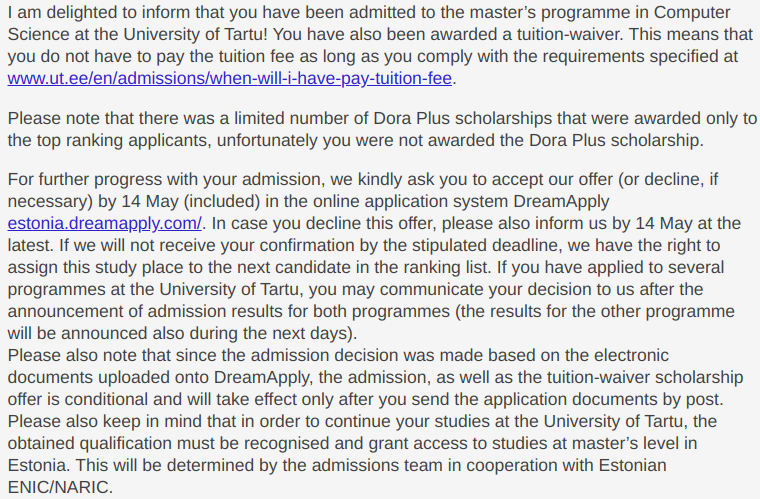
I decided that I would go anyway and maybe I could get some other scholarships later, or get a job to cover living expenses. To accept an invitation to study at a university, you need to send by mail certified copies of the same documents that you uploaded when applying.
I sent the documents, and after a while I received a letter that the university is still ready to provide me with the Dora Plus scholarship! Apparently, someone refused, and the list shifted.
3. Moving
The move process went quite smoothly too. The first thing I did was to collect the documents for applying for a temporary residence permit (TRP) and to find out how to get a place in the hostel.
3.1 Applying for a residence permit
The university website provides very good and clear instructions on what type of visa or documents you need to study as an international student. I needed TRP for study purposes. I signed up at the Estonian consulate in St. Petersburg, they usually sign up two weeks in advance. I submitted the documents, but I was warned that it takes up to three months to complete the TRP, and I might not have time to receive it until September. This is what happened to me, because I applied for it in June, and received it in early September in Tartu. To get around this point and enter Estonia legally, I made a type D visa for study. But I know of cases when people entered on a regular Schengen visa and received TRP already in Estonia, and everything was fine. For some reason I was scared to do this and decided to play it safe,as a Schengen visa cannot be used for travel for study purposes.

By the way, TRP looks like an id card, and it works the same way as an id card of a permanent resident of Estonia. What was most surprising to me was that it can be used to sign documents without leaving home. To do this, you need a special reader for the id-card, which is connected to the computer. Sometimes this reader is built into a laptop. It is also used as a travel card, as a ticket to the library, etc. Due to this, there are no problems with bureaucracy in Estonia.
3.2 Check-in at the hostel and the first days in Tartu
My most important advice is to apply to the dorm on the first day the application opens. Applications are processed on a first come, first served basis, so the sooner, the more likely it is to get a good seat. Or that it will get at all. It seems there were cases when people could not get a hostel before the start of the school year, but everything went well for me.
There are three hostels available for international students at the University of Tartu - on Narva mnt. 25, Narva mnt. 27 and Raatuse 22. I recommend applying in the first two - there are better conditions. But if you like parties and make some noise, then you are straight to Raatuse. Students who come to exchange for a semester are accommodated in Raatus. They usually want to have fun and it can get pretty noisy. In Raatus, the apartments consist of three rooms, a shared kitchen, shower and toilet. Usually two people live in a room. That is, there will be six people per kitchen, shower and toilet. Apartments in Narva consist of two rooms, and there are four people in the kitchen, shower and toilet. Besides, people often rent two places in a room. For the entire first year of my studies, I paid for two places and lived in a room alone, my flatmate too. We occupied the whole apartment together,which was very comfortable. In my second year, I lived in Raatus for a while, so I can compare from my own experience. If you like cleanliness and silence, I recommend choosing Narva.
I can say that the conditions in the hostels are very good. Comfortable beds, stable free internet, free laundry with tumble dryers, close to the center and to most of the university buildings.
This is how my room looked on the day of arrival:
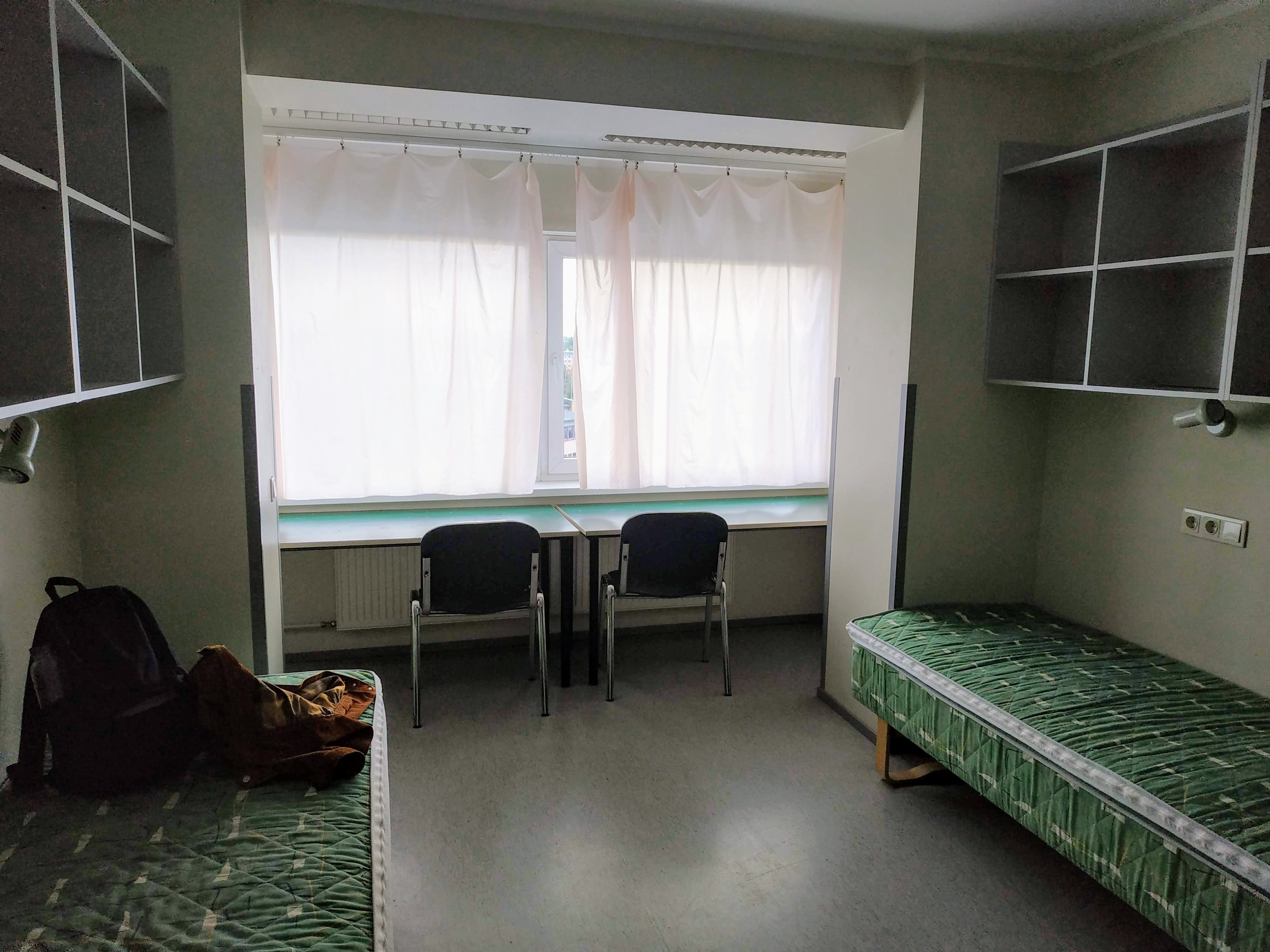
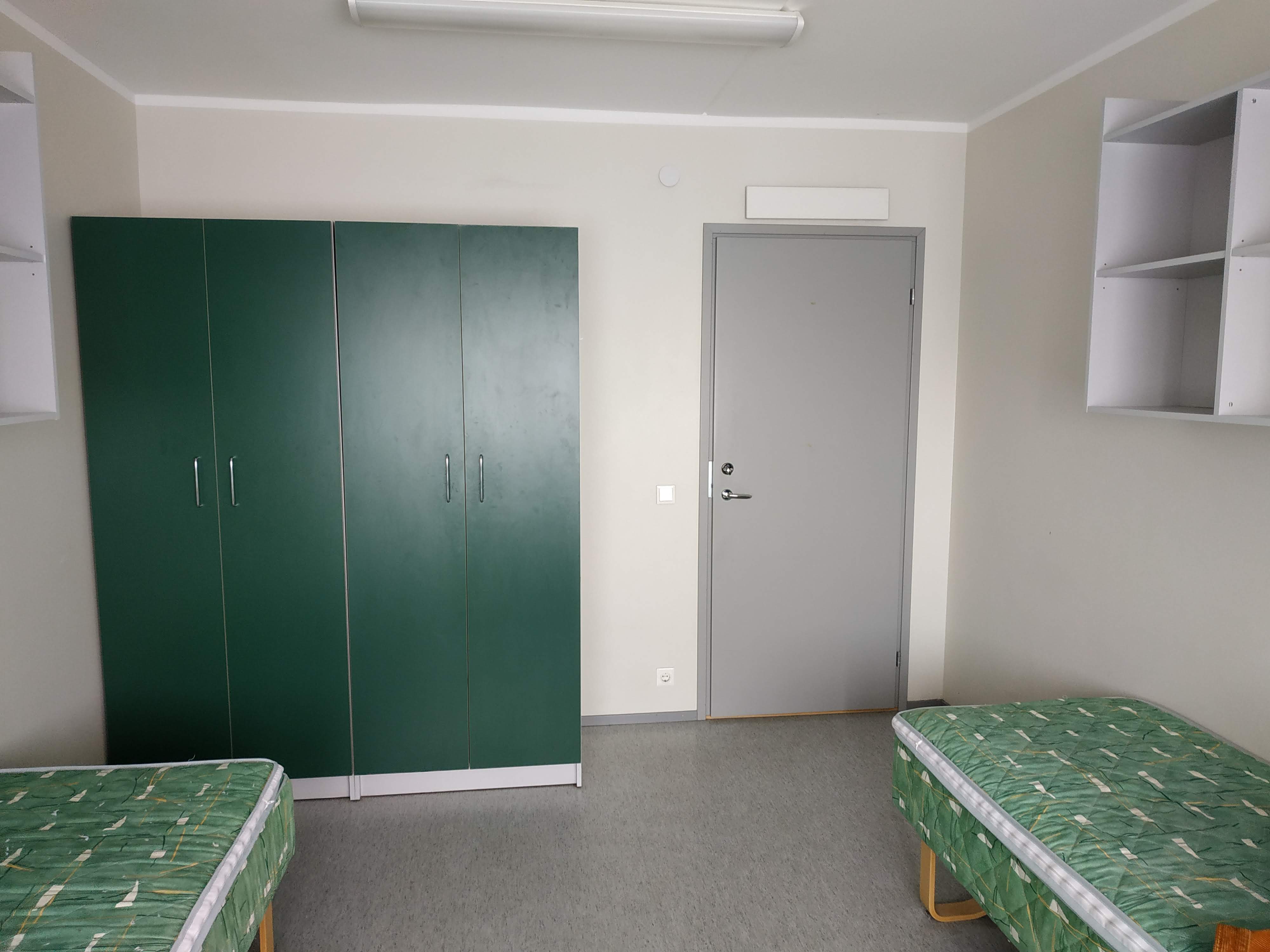
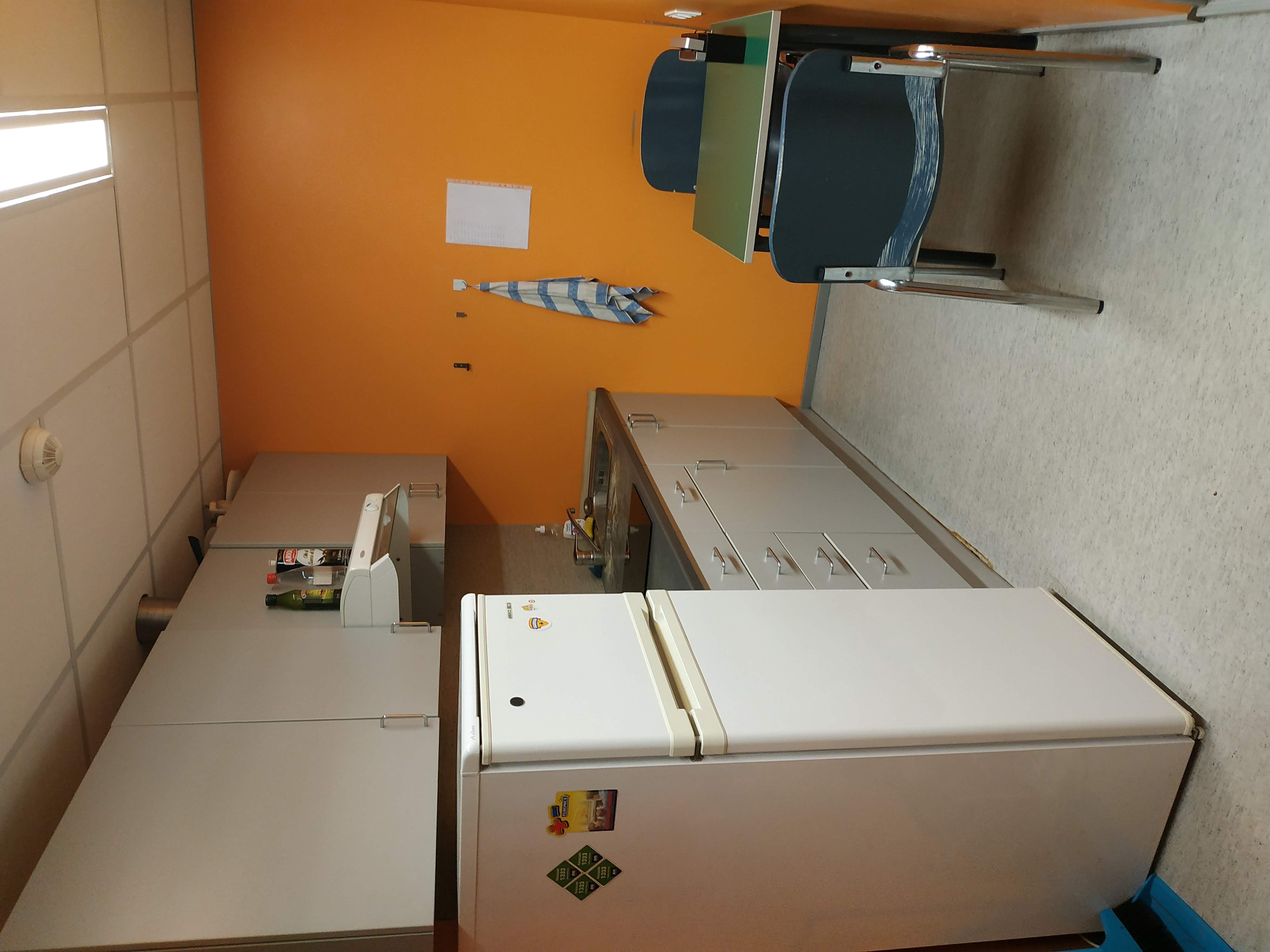
The university invited applicants to come a week before the start of their studies to conduct an orientation week. We were given excursions around the city, around the buildings of the university, around the library, around dormitories and were given gifts - shoppers (welcome bags), in which there were SIM cards with a certain amount of money on them, banks, city maps and something else. This is very cool, especially pleased and surprised that they issued prepaid SIM cards.

By the time I arrived in Tartu, I already knew which hostel I would live in, and I knew the room number. It only remained to go to the hostel building, ask for keys at the reception and fill out the contract. The check-in was very fast.
I do not recommend bringing a bunch of things with you - pillows, blankets and bedding can be bought on the first day, it will not be much more expensive than in Russia, and you will have a lot of things. It is also better to carry dishes to a minimum - sometimes the previous tenants leave something, and the rest can be bought. By the way, I was lucky - one of the previous tenants left a vacuum cleaner in our apartment, it was very helpful.
Already equipped room:
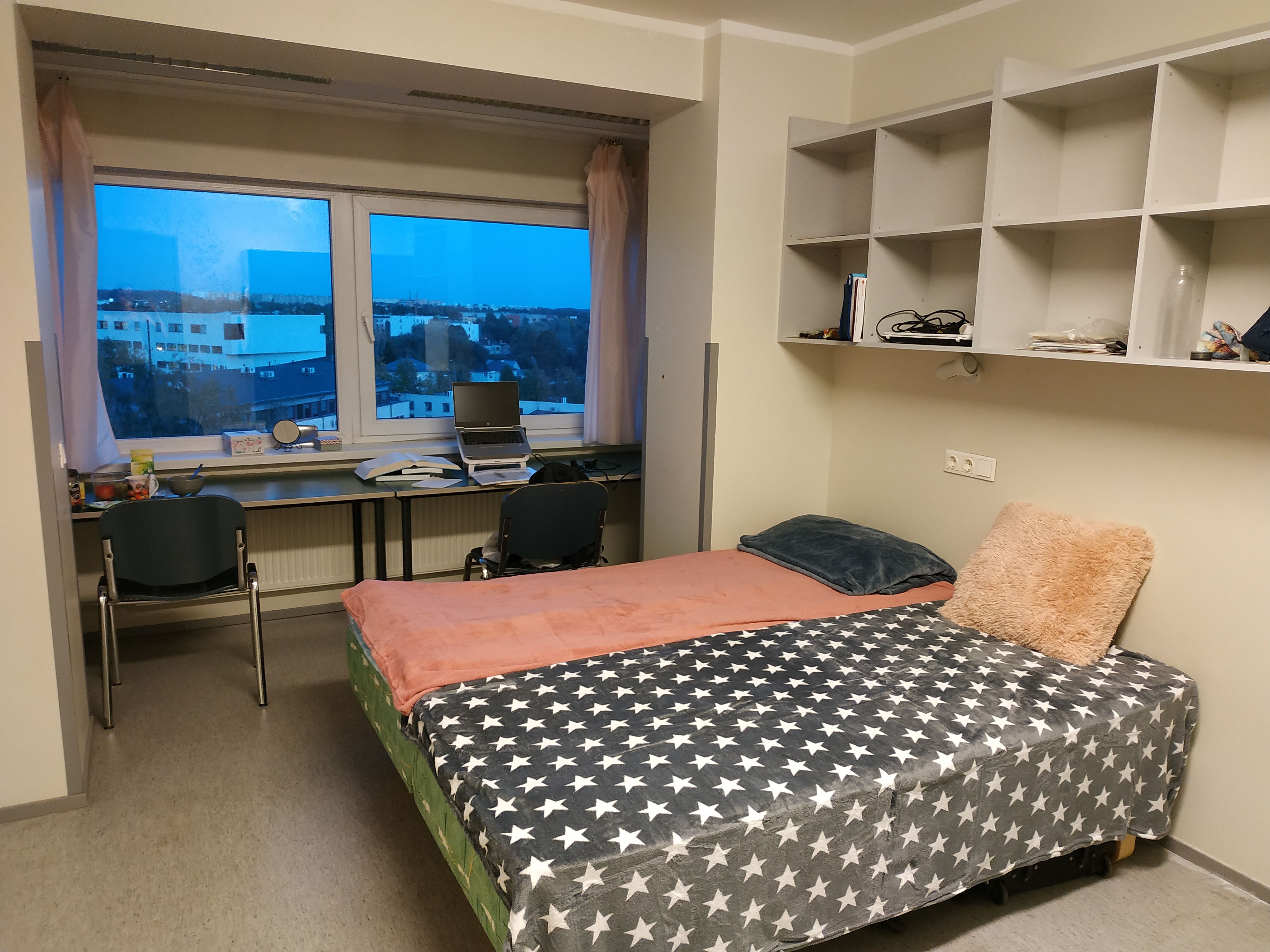
The big difference from Russian hostels is that couples are allowed to share a room, and you do not have to be married. They will just most likely be moved into an apartment where a couple also lives in another room.
For a place in a hostel a month usually comes out 95-110 euros with utility bills. Accordingly, if you want to live in a room without a neighbor, it will cost about 200 euros.
The dormitory contract is usually valid from September to the end of June, and then it can be extended. Some people move out for the summer, and then come back in the fall so as not to pay for the summer months. I moved out for the summer and the third semester, as I was on an internship first in Tallinn, then in Austria. I moved back in the winter at the beginning of the fourth semester, and there were no places in Narva, so I had to live in Raatus.
4. Life in Tartu
Tartu is a small town with a population of about 100,000. If you are from a millionaire city, it will seem very small. In 15-20 minutes you can walk from the center to the city border. But this has its advantages - no need to use transport, almost everything is within walking distance. The city has several shopping centers, cinemas, restaurants, museums, even a botanical garden. You can always find events and activities to your liking. The city is pleasant and European-looking. You need to communicate in shops and restaurants in English (or Estonian, if you know), unlike Tallinn, where more than 50% of the population understands Russian.
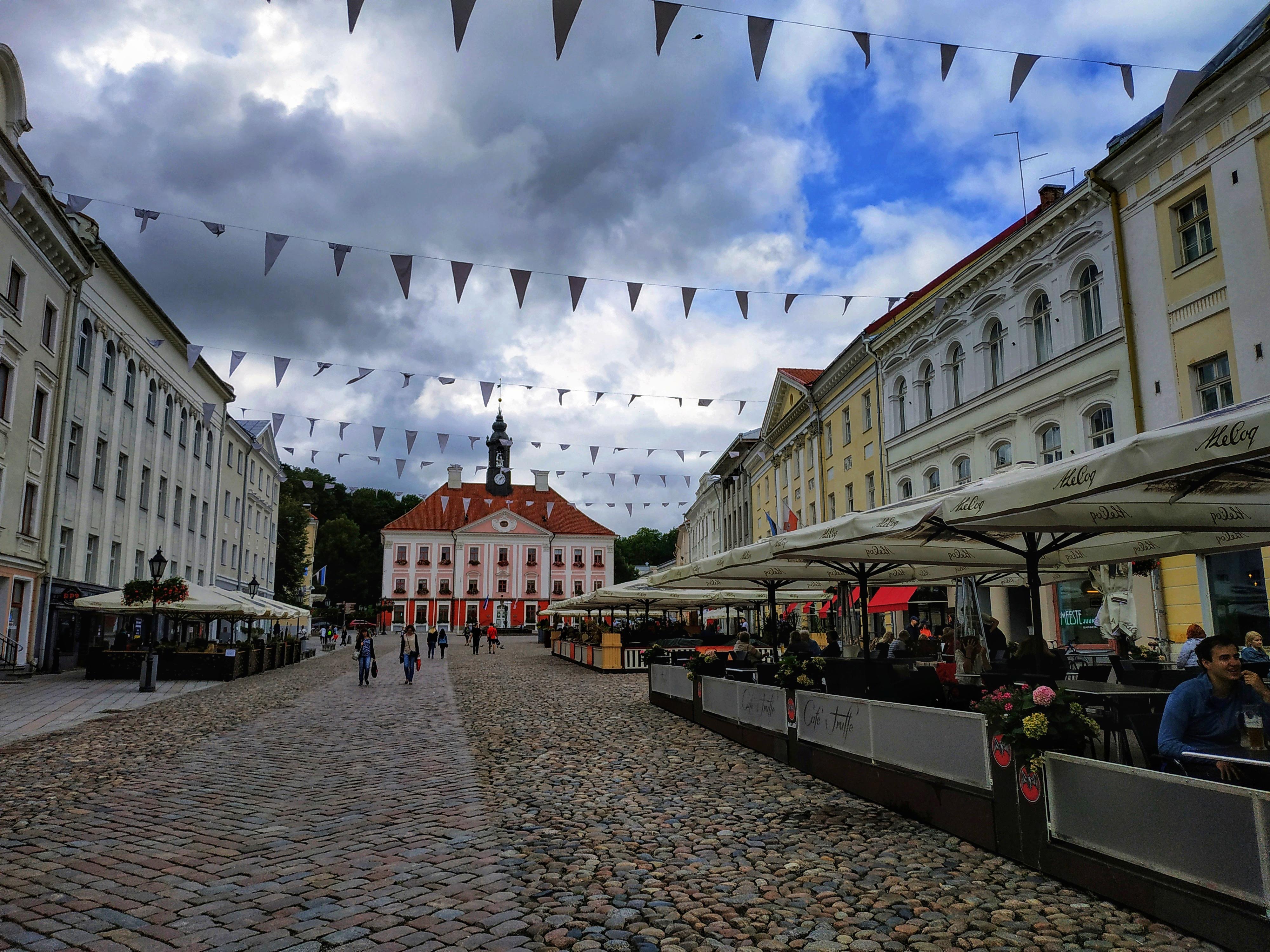
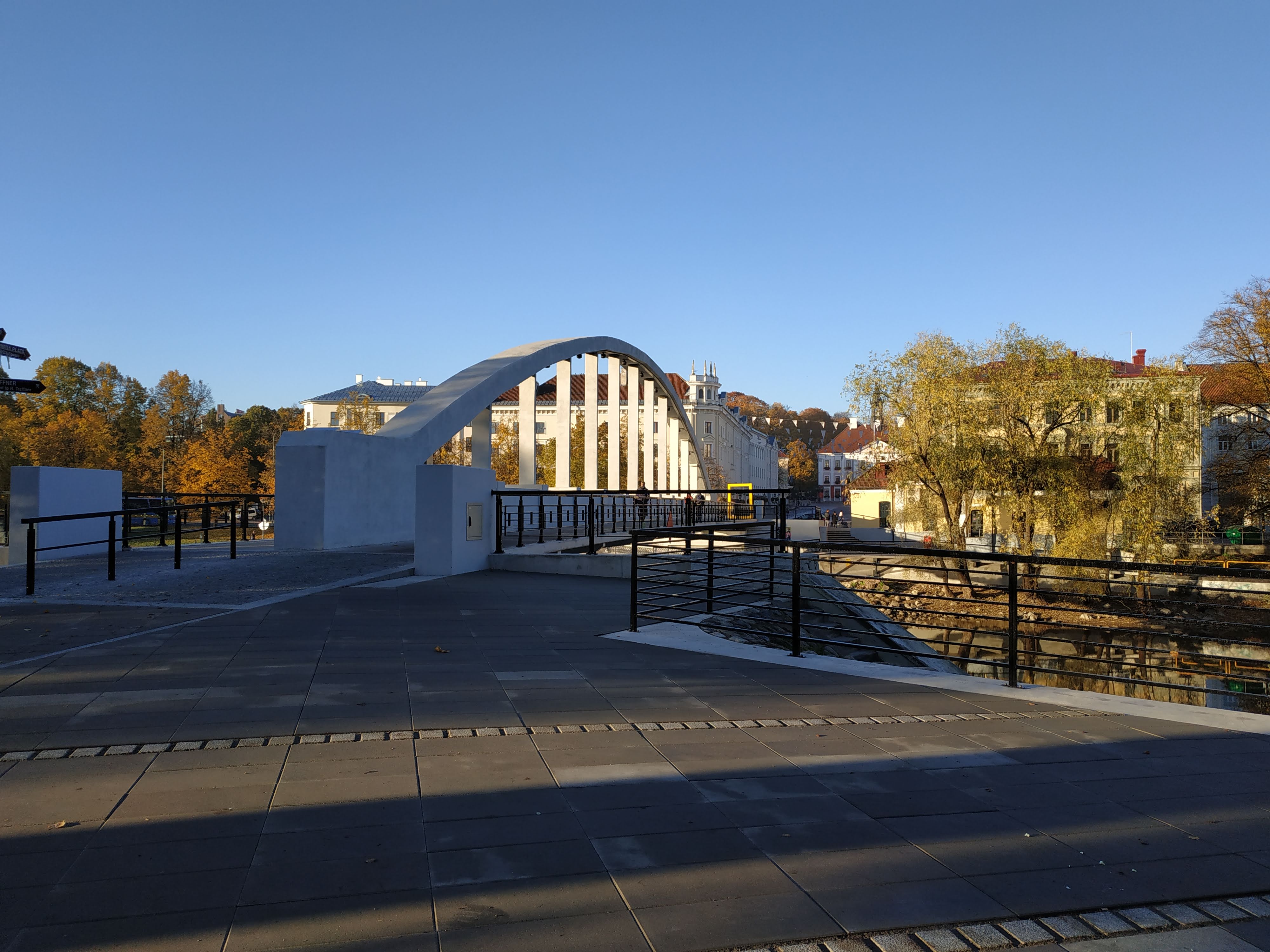
From Tartu, you can travel on a fairly budgetary basis by the Lux Express and Ecolines buses. There are several flights to St. Petersburg and Riga every day. Also, buses and trains run regularly to Tallinn, and in general throughout Estonia. The road to St. Petersburg takes about seven to eight hours, to Riga - about four. Tallinn can be reached in two and a half. Another bus to Tallinn calls at Tallinn Airport, from where you can find cheap flights to many European countries. Another two popular travel options are to take a ferry to Helsinki or Stockholm from Tallinn.
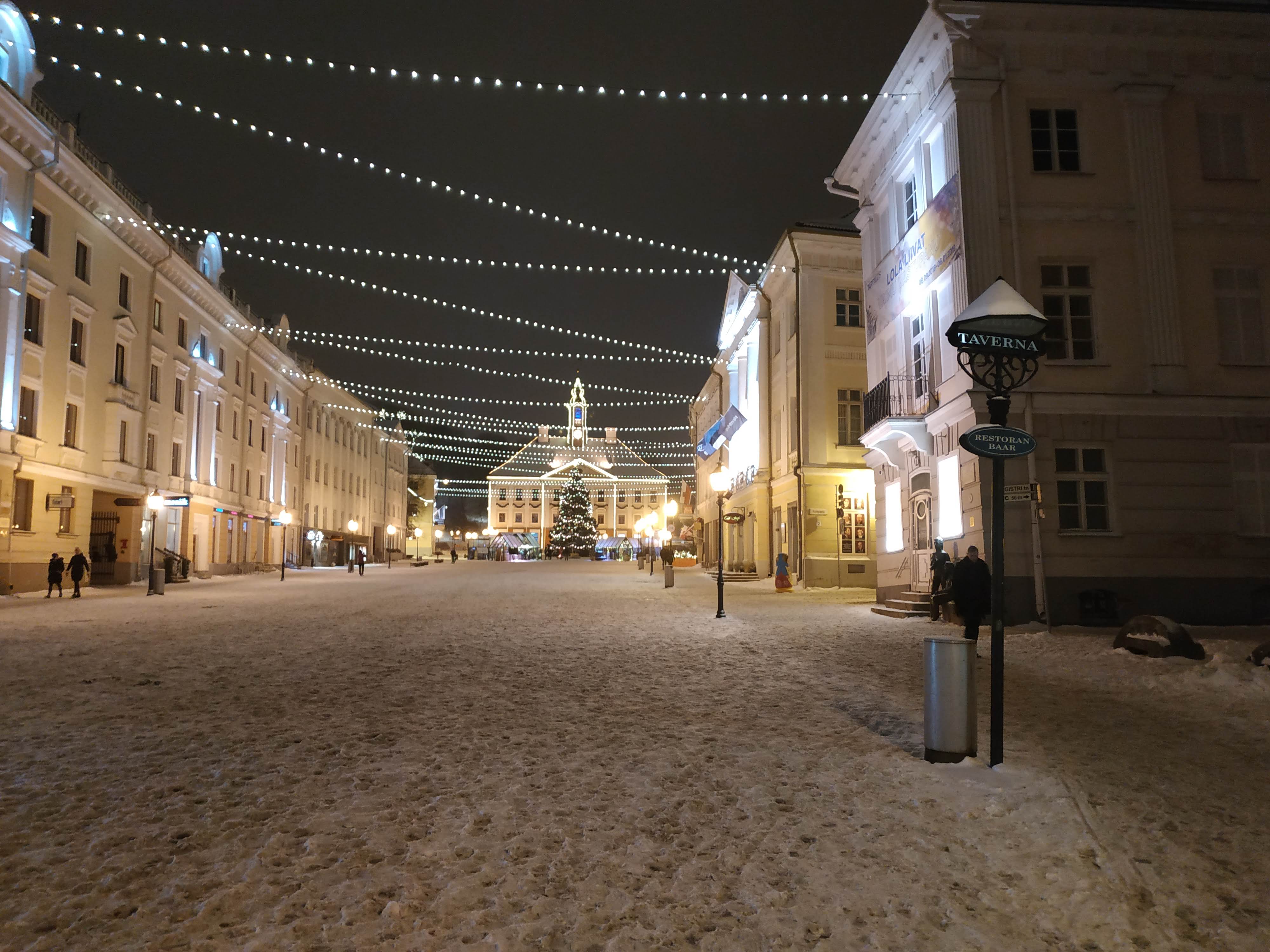
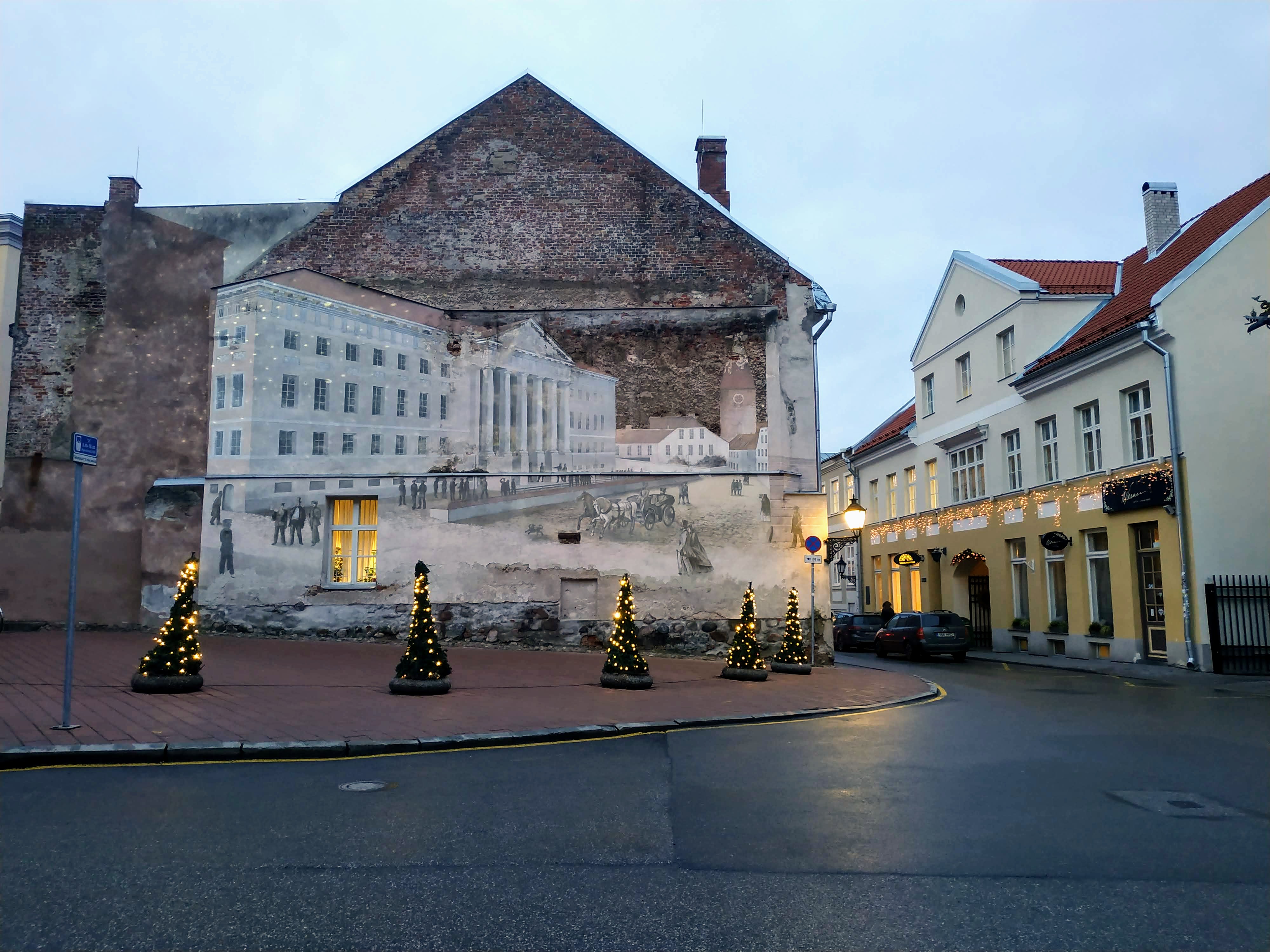
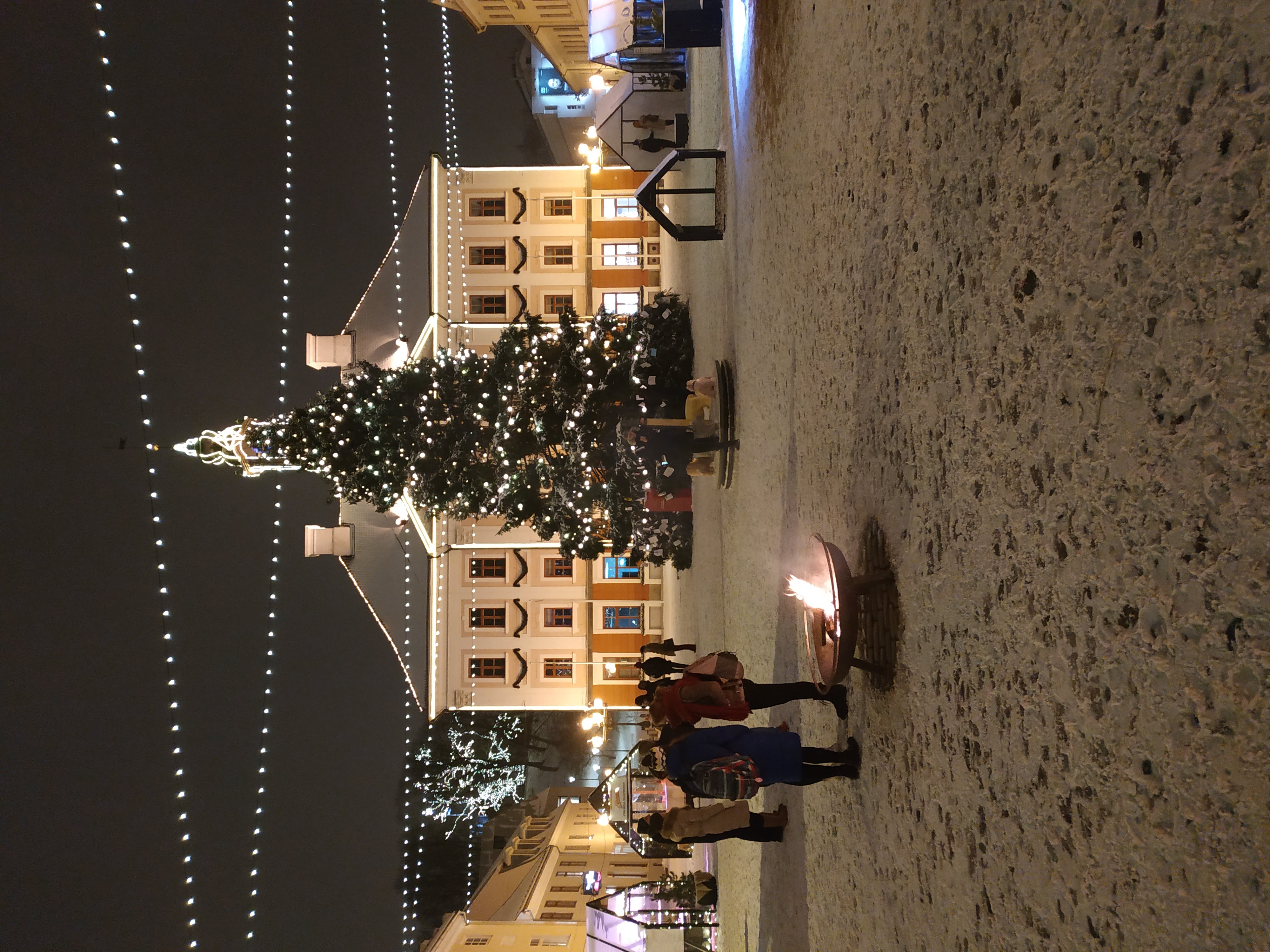
Living in Estonia is quite cheap, prices in stores are on average slightly higher than in Russia - with my pace of life it was comfortable for me to live on 500 euros, while 190-220 euros was spent on housing. But I mostly cooked at home, sometimes I went to lunch at university canteens, where on weekdays you can find lunches for 3-4 euros. Sometimes I went to a coffee shop for coffee, a couple of times a semester I went to St. Petersburg, Tallinn or Riga. If you go to restaurants and cafes more often, you will naturally spend more money. In general, it is quite realistic to live on 350-400 euros per month if you pay for one place in a hostel and eat at home. This money is exactly covered by the Dora Plus scholarship, that is, you can really live on the scholarship and not worry about work.
So Tartu is a pretty nice place to spend two years of Master's degree.
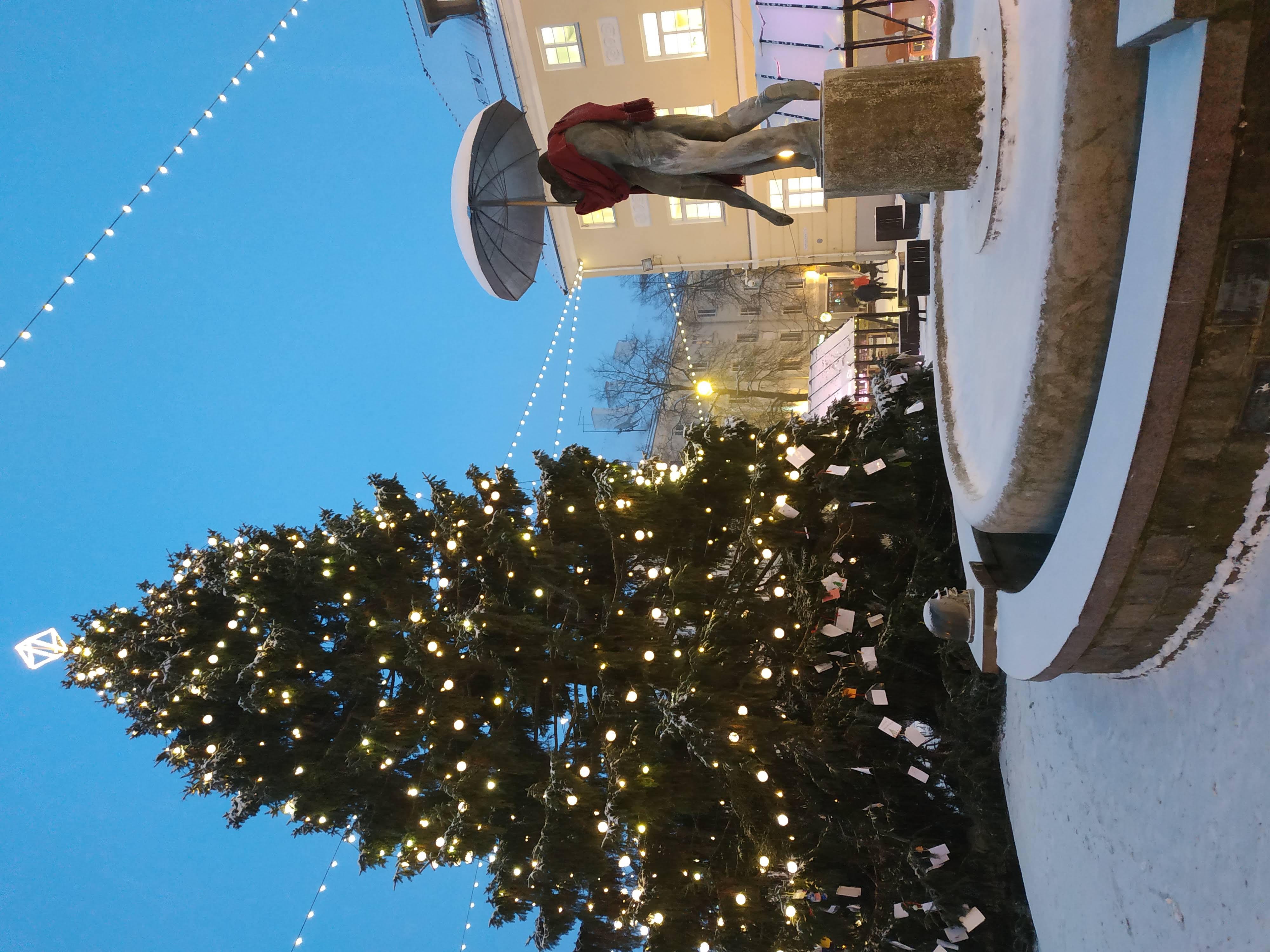
5.
So, about study. The first academic year began with the selection of courses per semester. The education system in Europe differs from the system in classical Russian universities - you yourself choose which courses you take. There are several compulsory courses that you will have to take during your Master's degree. We called it the core module, and it consisted of four basic courses. You choose the rest of the courses depending on your interests. I chose the specialization module in Data Science, so I took many courses related to machine learning and data analysis. In which semester which course to take, you decide for yourself. The main thing is that by the end of the training you have accumulated 120 credits (one course usually weighs 3 or 6 credits). One credit equals approximately 26 hours of work, but everything is, of course, relative.I took a maximum of 36 credits per semester, which is a pretty big load. I decided to take most of the courses in my first year to free up time in case I have a job next year. So in the first and second semester, I took 36 credits. Also, 120 credits include an internship in a company or practice in a research group and writing a master thesis. Often, students take on a larger load in the first two semesters, and then get an internship, which smoothly flows into full-time work.Also, 120 credits include an internship in a company or practice in a research group and writing a master thesis. Often, students take on a larger load in the first two semesters, and then get an internship, which smoothly flows into full-time work.Also, 120 credits include an internship in a company or practice in a research group and writing a master thesis. Often, students take on a larger load in the first two semesters, and then get an internship, which smoothly flows into full-time work.

I can assess the level of teaching as good. As with all universities, some courses are excellent, some are not. Strongly depends on the teacher. But I mostly liked the courses I took. The university also very quickly switched to online education when covid began, which also characterizes it on a good side. By the way, I defended myself by zoom.
Computer Science students can get a laptop while they study. It was a big surprise for me and it was very helpful, as a good powerful laptop will definitely come in handy while studying. And the Faculty of Science and Technology, which my institute belongs to, recently moved to a new classy modern building, the Delta Center . It was a pleasure to study in such an atmosphere.
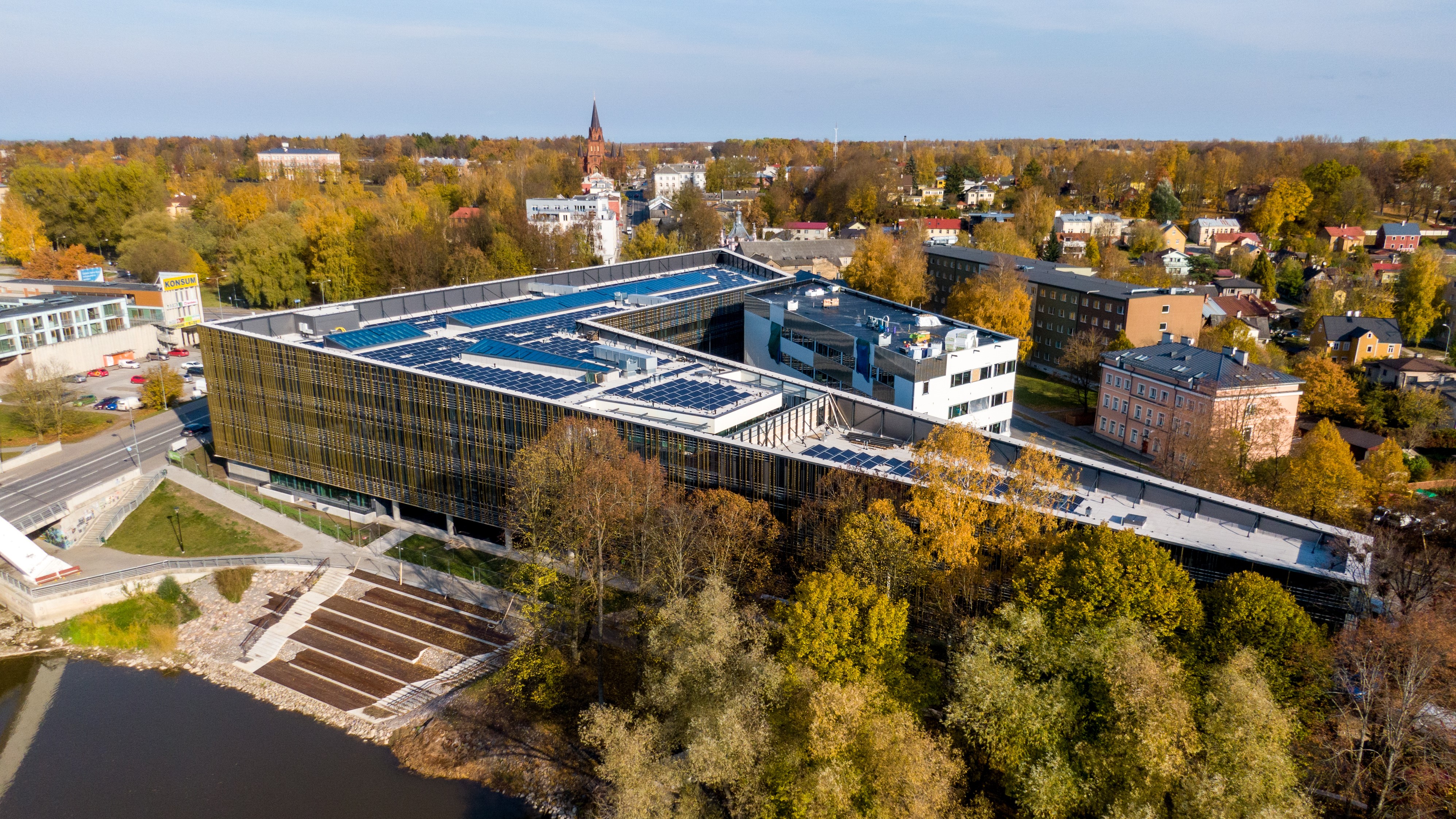
I would also like to mention that if the time of lectures on one subject overlaps with another, you can always agree with the teacher that you will not attend his class, but you will watch lectures at home in your free time and take homework on time. Yes, all lectures are recorded on video! For example, I successfully completed the Computational Neuroscience course in the third semester, appearing at the university only once - on the exam. I spent the third semester on an internship in Austria and I managed to get out of the situation and still take the course that I really wanted.
By the way, about internships. As I wrote above, an internship is a mandatory part of the MSc Computer Science program. I was afraid that I would not be able to find a good internship, as I had no practical experience in programming and experience in interviewing, especially in English. Another fear of mine was that I would not receive a scholarship for the second year of study - Dora Plus is given only for the first year, and then I have to apply again, and in the second year they are allocated several times less. There are also a couple of scholarships that can be applied for each semester, they are also allocated based on academic success. You can really get a scholarship if you have a high GPA, you participate in some activities, scientific activities, etc. In a word, they are given to those in the top. Spoiler: I did get a scholarship. And not only Dora Plus, but a couple of others.The main thing is to try and have a good GPA and a large number of credits collected in the first year, and everything will be ok.
So, in the spring of 2019, I was actively looking for internships, preferably paid ones. The University of Tartu has career days every spring and this is a great place to find an internship with a company. For example, thanks to a career day, I went to interviews at Microsoft and Twilio and, most importantly, received an offer from MindTitan, where I ended up interning in the summer after my first year as a date scientist. Another opportunity to find an internship is to participate in projects that companies do in conjunction with the university. You can find out about them by talking with teachers and from the institute's mailing lists. For example, during my studies, the university had contracts with Bolt, Swedbank, Huawei and other well-known companies. I also managed to attend a research internship in Austria,as a result of which I wrote my master's thesis. So don't be afraid that you won't find an internship, internship or job - there are always options, and internships are also well paid. Those interested in research activities often find jobs in a university's research group, and they pay for that too. Many work as teaching assistants and help professors teach courses. There are enough opportunities to find what you like.enough.enough.
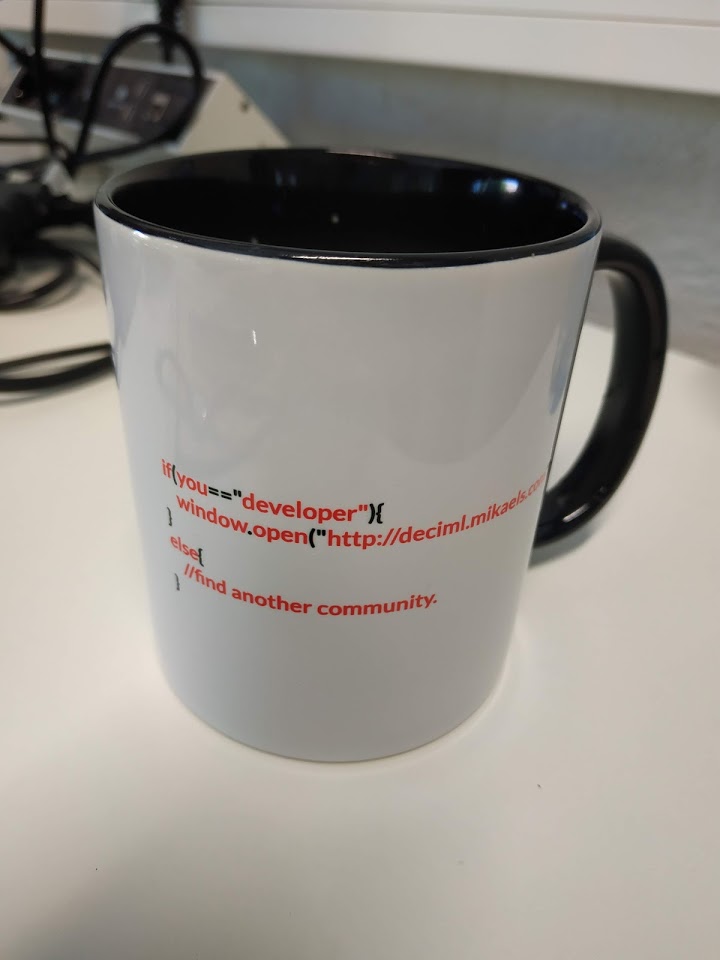
6. Conclusion
In conclusion, I want to say that the university has given me an incredible amount of opportunities for development, and I have grown a lot professionally and in terms of soft skills during this time. It was a cool experience that got me out of my comfort zone and grow faster.
Now I have returned to Russia and started looking for work as a data scientist. It was easy to get the first couple of offers, which confirms that the university gave me a good base to start working in my specialty. In addition, I think the experience of studying abroad will be a big plus if in the future I want to move and work in Europe again.
For those who are now at the stage of admission or want to try, but do not dare, I want to say that everything is not as difficult as it seems. And yet, my example proves that it is possible to enter and successfully complete English-language programs even with a very intermediate level of English - it improves very quickly when you are constantly in an environment where there is nothing without it.